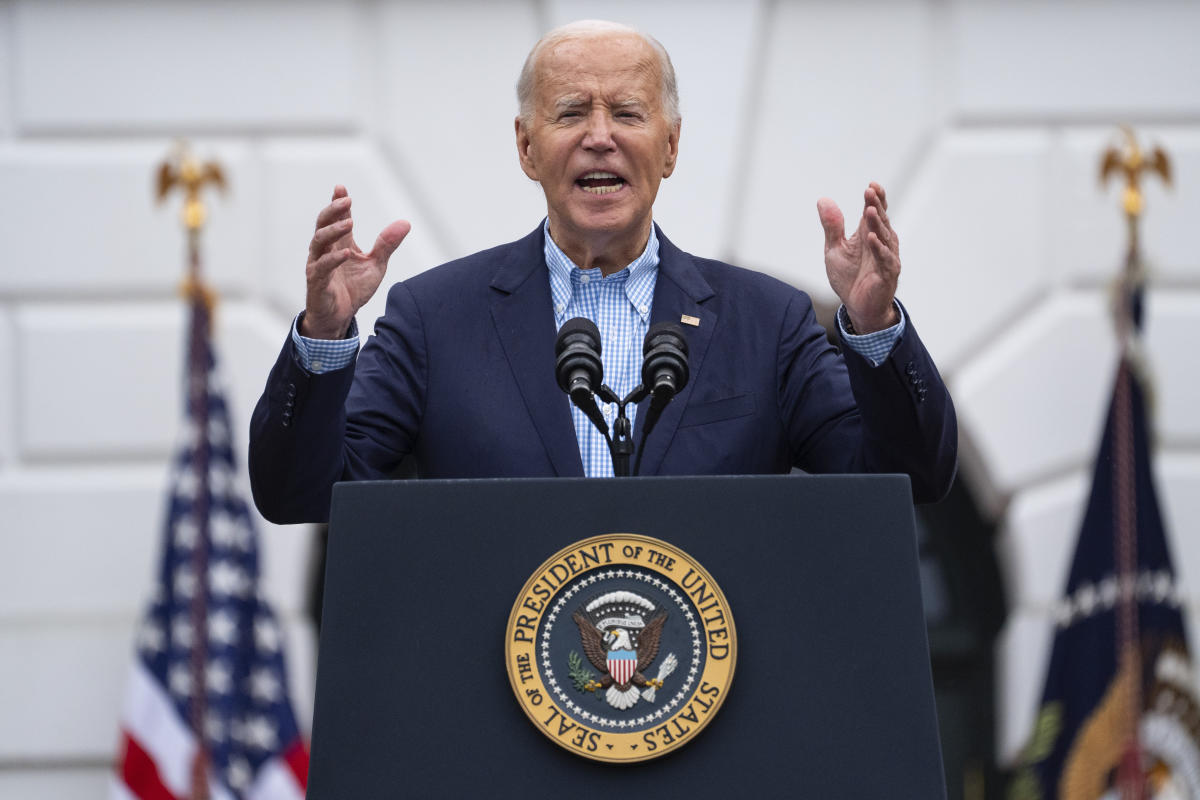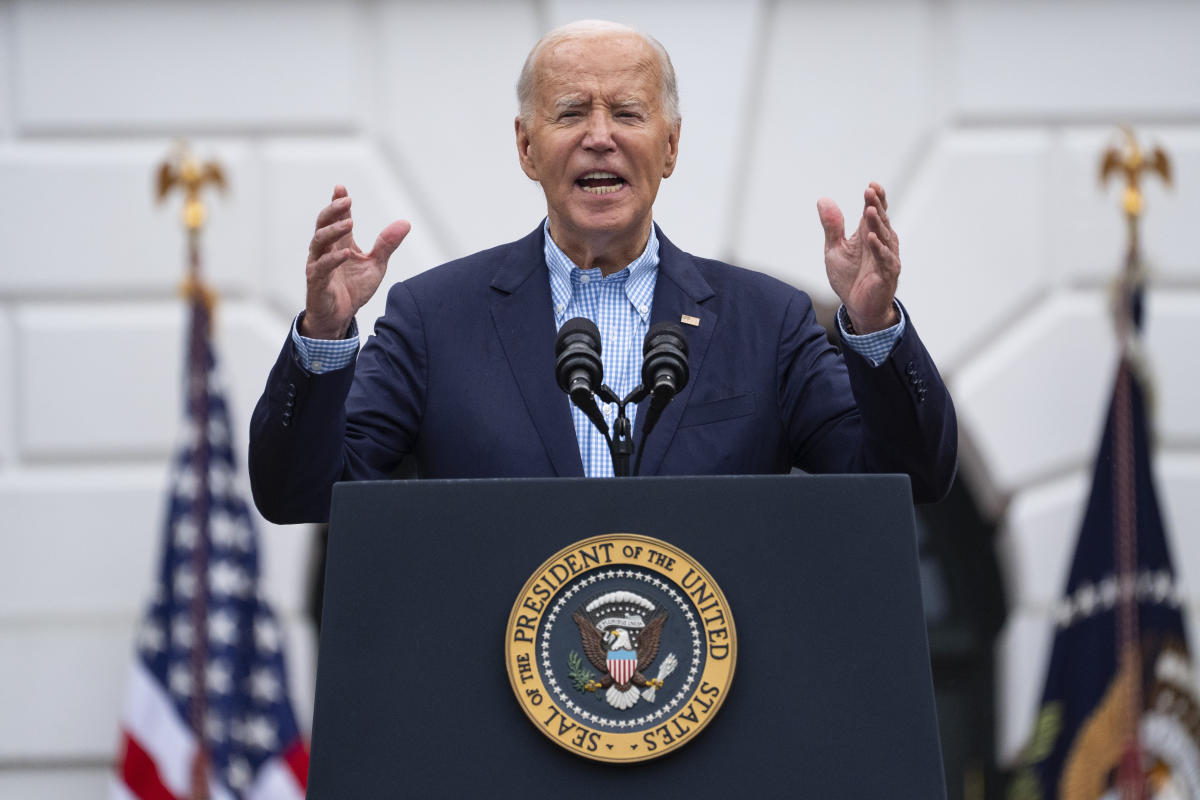
Sen. John Fetterman, the Pennsylvania Democrat and steadfast Joe Biden supporter, says all the president’s doubters in his own party “need to get a spine or grow a set — one or the other.”
In fact, as members of Congress prepare to return to Washington — joined by a delegation of foreign leaders arriving for the NATO summit — Biden’s fate hinges on exactly the opposite of what Fetterman called for in his vivid word picture.
A widespread infusion of fortitude — of either the skeletal or testicular variety — among more Democrats would almost certainly spell doom for Biden. He likely could not withstand many more people saying in a forceful, public way what scores of them really think and frantically whisper about in private.
Biden’s best hope for survival is the timidity of his skeptics.
As it is, many of the most influential party leaders are ending the holiday weekend right where they started it: standing on the ledge, asking themselves whether they have the nerve to jump and wondering whether a critical mass of other people will join them if they do.
Biden’s televised Friday evening encounter with George Stephanopoulos of ABC News did nothing to make Democrats’ cliff time easier. The president was at the apparent upper range of his contemporaneous speaking abilities — inarticulate but not incoherent — neither bad enough to fortify beyond refutation arguments that he must go, nor good enough to provide reassurance about his determination to say.
Two realities about where Democrats stand are now vividly clear, in the wake of Biden’s interview.
The first reality is that there will be no subtle or indirect way of driving change at the top of the ticket. If top Democrats want Biden gone, they must say so directly to his face and publicly. He isn’t going to be moved by furrowed-brow comments — like former House Speaker Nancy Pelosi’s rumination about whether Biden’s poor debate performance against former President Donald Trump reflected an unfortunate “episode” or a more worrisome underlying “condition.” Biden isn’t going to change his mind if only party leaders “give him space” to reflect searchingly on the options.
Instead, the initiative — if it is to be taken at all — will come from other people deciding to take the Fetterman challenge.
Two important venues will come over the next two days.
House Minority Leader Hakeem Jeffries is assembling top Democrats to discuss the matter in a Zoom meeting on Sunday. Senate Intelligence Committee Chair Mark Warner (D-Va.), who has made clear his doubts about Biden through others but not voiced them directly in public, is assembling like-minded senators to discuss options. It seems unlikely that Biden would regard Jeffries or Warner as a surrogate for “the Lord Almighty” — the only voice Biden told Stephanopoulos he would listen to — but both politicians and plenty of others have the power to back Biden into a corner.
But penetrating the president’s psychic fortress of determination to fight on and his denial that there is any good reason not to — Biden said “I don’t believe polls” showing him trailing behind Trump — would require more than back-channel signaling to White House aides that they are prepared to speak out.
They would actually have to do it. But so far, most Democrats aren’t doing more than thinking about doing it.
That leads to the second reality that has come into focus in recent days: The anti-Trump party has become strikingly like the Trump party in several key respects.
At the outset of the Trump years — before Trump remade the GOP comprehensively around his own ambitions and grievances — the Republican establishment in 2016 and for several years afterward was much like the Democratic establishment is now. In other words, then as now, journalists could fill up notebooks with politicians on background bemoaning their party’s own nominee and wishing reality was something different.
Republicans feared the wrath of their own base by saying what they think of Trump. This is not exactly the fear that Democrats have of saying what they think about Biden — polls show a majority of Democrats have expressed concern about his age. But they do fear uncertainty: What if efforts to push the incumbent out succeed and Trump wins anyway? Who owns that failure?
No matter what happens in November, Democrats are also aware of the “which side are you on?” psychology that pervades both parties.
One House Democrat in a battleground district told POLITICO: “Interestingly, not a single in-district person encouraged me to get out there and encourage him to step aside. They are pissed at Dems who are stirring the pot.”
For now, it is clear Trump has the Democratic Party in his grip no less than the Republican Party.
There has been more mirror-imaging on display in recent days. The argument against Trump is that he shatters prevailing norms. But those have been shattered on the Democratic side, too. Until recently, there was no version of normal in American history that had a president with abundantly visible aging asking voters to elect him to a second term that will end by the time he’s 86.
Stephanopoulos properly pressed him: Has he undertaken a full neurological exam? “No. No one said I had to,” Biden replied. “No one said. They said I’m good.” As for releasing more detailed medical results, Biden dodged in ways that made clear his answer is the same as Trump’s on matters of disclosure: Forget it.
Biden has suggested that his rationale for staying in the race rests partly on an almost mystical belief that it is his special destiny to defeat Trump in 2024 as he did in 2020, citing all the times in his career that “no one thought” he could prevail but he did. That isn’t so different than Trump’s 2016 declaration that “I alone can fix” the problems of the country.
Nor were Democrats reassured by Biden’s statement that, if Trump does win and all the bad things Biden has predicted come to pass, he will be able to live with himself: “I’ll feel as long as I gave it my all and I did the goodest job as I know I can do, that’s what this is about.”
In an era of old norms, that word alone — “goodest” — would have drawn ample notice coming from a president’s mouth, but in the current context, it does not especially attract notice.
That phenomenon — desensitization to what once would have been alarming — was also on display in recent days. Perhaps you heard Trump’s comments, captured on a video published by the Daily Beast, while at his New Jersey golf course on July Fourth. He told bystanders that Biden is “a broken-down pile of crap,” and predicted he would soon be running instead against Vice President Kamala Harris, before adding, “She’s just so fucking bad.”
Nearly a quarter-century ago, when candidate George W. Bush was caught on a hot mike calling New York Times reporter Adam Clymer a “major-league asshole” that was a blaring news story for many days. Trump’s comments the other day were picked up by news organizations with no real shock — the equivalent of a shoulder shrug. For that matter, Fetterman’s vulgar language was notable largely for not being especially notable by prevailing standards.
It is not just Biden and Democrats who are living by the new norms of the Trump Era. For now, it is everyone.
EMEA Tribune is not involved in this news article, it is taken from our partners and or from the News Agencies. Copyright and Credit go to the News Agencies, email news@emeatribune.com Follow our WhatsApp verified Channel





